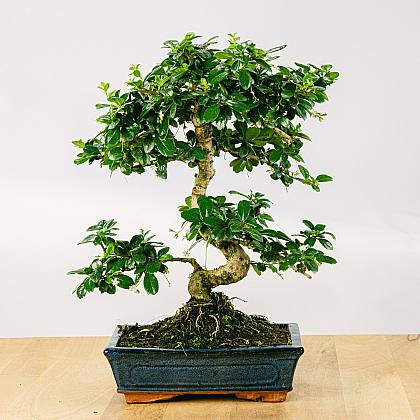Learn how to use organic fertilisers for sustainable and environmentally friendly farming
Would you like to learn how to take care of your plants in a sustainable and environmentally friendly way? Then you're in the right place. In this article, you...
Would you like to learn how to take care of your plants in a sustainable and environmentally friendly way? Then you're in the right place. In this article, you will find out all about organic fertilisers and how to use them to achieve a healthy and nature-friendly crop. organic fertilizers are a natural and effective alternative to nourish your plants without harming the environment. In addition, you will be surprised to learn about the multiple benefits they have for both your plants and the planet. Get ready to enter the fascinating world of organic fertilisers and transform your garden into a green oasis!
What are organic fertilisers and why are they important?
Organic fertilizers are natural products that are used to nourish and improve the quality of the soil in crops. They are a healthy and environmentally friendly alternative, as they are composed of biodegradable materials such as plant waste, animal manure, compost, among others. Why are they important? Because they are a source of life for our plants! These fertilisers provide essential nutrients such as nitrogen, phosphorus and potassium, which are essential for plant growth and development. In addition, they improve soil structure, increasing its ability to retain water and nutrients, resulting in better crop yields. But that's not all, they also help prevent diseases and pests, strengthening the plants' natural defenses. Isn't that wonderful? In addition, by using organic fertilisers we are contributing to taking care of the environment. We are preventing soil and water contamination with harmful chemicals. We are promoting a sustainable farming system that respects natural cycles and promotes biodiversity. So now you know, if you want to have a healthy and planet-friendly crop, organic fertilisers are your best ally. Try them and you'll see the difference!
Benefits of using organic fertilisers in your grow
Organic fertilizers are an excellent option to improve the health and yield of your crops. There are numerous benefits to using this type of fertilizer that will not only benefit your plants, but also the environment. First of all, organic fertilizers are completely natural and do not contain harmful chemicals. This means that you won't be exposed to toxic substances when handling them, and your plants won't be exposed to them either. In addition, organic fertilizers are rich in essential nutrients for plants, such as nitrogen, phosphorus, and potassium. These nutrients help strengthen roots, improve disease resistance, and promote healthy growth. Another important benefit is that organic fertilizers improve soil structure, making it easier to retain water and reduce erosion. This is especially beneficial in areas where water is scarce. They also help to increase soil biodiversity, promoting the presence of beneficial organisms such as earthworms and microorganisms that contribute to an ecological balance. In short, using organic fertilisers in your grow will not only provide you with healthier and more productive plants, but you will also be contributing to taking care of the environment and promoting sustainable practices.
Types of organic fertilisers and how to use them properly
There are different types of organic fertilisers that you can use in your grow, and each has its own characteristics and benefits. One of the most common is compost, which is obtained from the decomposition of organic matter such as vegetable and fruit scraps. Compost is very rich in nutrients and improves soil structure, making it ideal for enriching your soil before sowing your plants. Another type of organic fertilizer is manure, which comes from animals such as cows, horses, or chickens. This fertilizer provides essential nutrients such as nitrogen, phosphorus and potassium, but it is important to use it correctly to avoid unpleasant odors and pollution. You can also use green manures, which are plants such as legumes or cruciferous plants that are planted with the purpose of being incorporated into the soil and improving its fertility. These plants have the ability to fix atmospheric nitrogen and increase soil organic matter. Finally, you can use liquid fertilisers such as worm castings or plant extracts, which are applied diluted in water and are quickly absorbed by the plants. Remember to follow the instructions for use of each type of organic fertilizer and adapt them to the specific needs of your crop. In this way, you will be able to make the most of its benefits and contribute to sustainable and environmentally friendly cultivation.
The positive impact of organic fertilisers on the environment
Organic fertilisers have a positive impact on the environment because they promote sustainability and respect for our planet. By using organic fertilizers, we avoid the use of chemicals that damage soils and pollute water. In addition, these fertilizers are biodegradable, which means that they decompose naturally without leaving toxic residues. By nourishing plants naturally, organic fertilisers also contribute to maintaining biodiversity in our crops, as they do not affect beneficial organisms such as earthworms or pollinating insects. This creates a balance in agricultural ecosystems and helps preserve soil health in the long term. It is also important to note that organic fertilizers reduce the emission of greenhouse gases, as they do not contain chemical compounds that contribute to global warming. In short, using organic fertilizers is a simple yet powerful way to take care of the environment and protect our earth for future generations.
How to Make Your Own Homemade Organic Fertilizer
If you are a gardener and want to take care of the environment, learning how to make your own homemade organic fertilizer can be a great option. In addition to being an economical way to nourish your plants, it is a way to take advantage of the organic waste we generate at home. You can use fruit and vegetable scraps, eggshells, coffee grounds, and dried leaves to create a nutrient-dense compost. You just need a suitable composting container, such as a compost bin or a simple bin with holes in the base to allow excess liquid to drain. Add organic waste as you generate it, making sure to maintain a balanced ratio between green matter (food scraps) and dry matter (dry leaves). It is important to stir the contents from time to time to promote decomposition and avoid bad odors. You'll see how little by little that waste transforms into a dark, smelly compost, ready to feed your plants and help them grow strong and healthy. There is nothing more rewarding than seeing the result of your own effort in the form of colorful flowers and delicious vegetables!
Tips for maximizing results with organic fertilizers
When it comes to maximizing results with organic fertilizers, there are a few tips that can make all the difference in your plant growth. First, be sure to follow the manufacturer's instructions for the proper amount of fertilizer to use. Don't overdo it, as too much compost can damage the roots and affect the nutritional balance of the plants. In addition, it is important to apply fertilizer at the right time. It's usually best to do this during the spring or fall, when the plants are in their active growth phase. Another recommendation is to combine different types of organic fertilizers to obtain a more complete mix of nutrients. You can use compost, manure, food scraps, or even compost tea to enrich the soil in a balanced way. Also, don't forget to water your plants regularly to ensure that the nutrients in the compost are absorbed properly. And finally, remember to be patient and consistent in the use of organic fertilizers. The results may not be immediate, but in the long run you will see your plants grow healthier and stronger. So go ahead and try these tips and enjoy sustainable and environmentally friendly cultivation!
Organic fertilisers: a healthy alternative for your plants and the planet
Organic fertilisers: a healthy alternative for your plants and the planet
If you're concerned about the well-being of your plants and the impact you have on the environment, organic fertilisers are the perfect solution. These natural fertilizers are a healthy and planet-friendly alternative, as they do not contain harmful chemicals or toxins. By using organic fertilizers, you're providing your plants with the essential nutrients they need to grow strong and healthy, without putting your health or the environment at risk.
In addition, organic fertilizers have multiple benefits for your crops. Not only do they improve soil quality, but they also promote more vigorous plant growth, increase resistance to diseases and pests, and promote water retention in the soil. This means that your plants will be more protected and more resistant to adverse conditions such as droughts or floods.
The proper use of organic fertilisers is key to obtaining the best results. It is important to know the different types of fertilizers available, such as compost, manure or kitchen scraps, and to know how to use them correctly according to the needs of each plant. Also, you should keep in mind that organic fertilizers take longer to release their nutrients, so it is necessary to plan and apply them in advance.
In short, using organic fertilizers is a smart choice to take care of your plants and the environment. Not only will you be providing natural nutrients to your crops, but you will also be contributing to the sustainability and preservation of the planet. Dare to try this healthy alternative and you'll see how your plants will thank you!
Discover the power of organic fertilisers and join the movement for sustainable and environmentally friendly farming! Knowing the importance of these natural fertilizers and their benefits for your crop will allow you to take care of your plants in a healthy and planet-friendly way. Learn how to use different types of organic fertilisers properly, maximise results with practical tips and find out how to make your own homemade fertiliser. Also, don't forget the positive impact that organic fertilizers have on the environment, by contributing to the reduction of waste and the conservation of biodiversity. Now it's your turn to experiment and explore new alternatives to grow responsibly. What type of compost will you try first? Keep learning and enjoying the exciting world of sustainable gardening!


